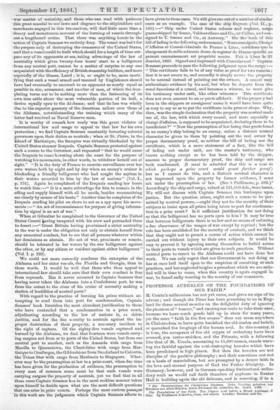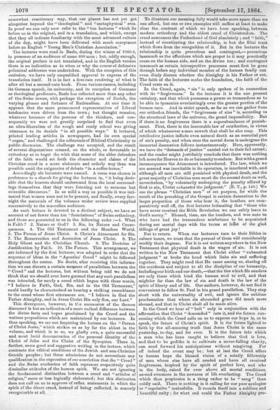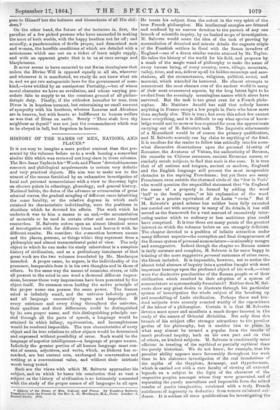PROFESSOR AUBERLEN ON THE FOUNDATIONS OF OUR FAITH.*
M. COMTE'S millennium has not yet come, and gives no sign of 'its advent ; and though the Times has been preaching to us in Eng- land for these several months on the delightful duty of ignoring the phantom of " honour," and causing our souls to take their ease, because we have much goods laid up in store for many years, yet the mere " faith in the five senses " does not seem anywhere in Christendom to have quite banished the old doubts and beliefs, or quenched the longings of the human soul. In this country, it is true, the occupants of the old crypts of orthodoxy have been aroused, yea terror-stricken, and the Primate, with a following like that of St. Ursula, amounting to 11,000 names, stands warn- ing the faithful against the soul-destroying heresies which 'have been proclaimed in high places. But then the heretics are not disciples of the positive philosophy ; and their assertions rest not on a basis of materialism, but are prompted by a deeper faith in the love and eternal purpose of God the Father Almighty. In Germany, however, and in German-speaking Switzerland, ortho- doxy such as would call forth thunders of applause in Exeter Hall is building again the old defences, and is asserting, if in a • Zur Verantwortung des Christ:tate& Glaubens. Zahn Vol-mitre gehaltan for Manner-a sus alien Standen dureb Professor Dr. Auberleu, dco. LiaaeL 1862. The Foundations of Our Faith. Ten ripen read before a Mixed Andliwas Men. By Professore Auberleu, Gass, and others. London: Eltrahau and 00. somewhat reactionary way, that our planet has not yet got altogether beyond the " theological " and "metaphysical " eras. In proof we can only now refer to the "ten lectures" which lie before us in the original, and in a translation, and which, except that they all indicate familiarity with the most advanced culture of the day, might have been delivered with much acceptance before an English "Young Men's Christian Association."
The lectures were read in Basle, during the winter of 1860-1, in presence of an audience of some 600 men ; but, oddly enough, the original preface is not translated, and in the English version there is no indication as to when or why the course of defensive polemical addresses was undertaken. With the exception of this omission, we have only unqualified approval to express of the translation itself. It is in fact a first-rate rendering of what is after all but a second-rate book. From various causes, including its German speech, its university, and its reception of Germans as theological professors, Basle has reflected more than any other of the Swiss towns, with perhaps the exception of Zurich, the varying phases and fortunes of Rationalism. At one time it appears that the more pronounced representatives of Liberal tendencies were driven from the town ; but thought remains, whatever becomes of the persons of the thinkers, and con- sequently we were not greatly surprised to find that even an ultra-liberalism of the rough and ready school was giving utterance to its denials "in all possible ways." It lectured, printed leading articles in newspapers, had its own special " organ," and challenged the adherents of Biblical Christianity to public discussion. The challenge was accepted, and the result of several disputations seemed, on the whole, so favourable to orthodoxy as to beget the wish that some of the abler defenders of the faith would set forth the character and claims of the Christian creed in a more elaborate and orderly way than was possible amid the exigencies of debate "in a coffee-house."
Accordingly six lecturers were named. A room was chosen in preference to a church for giving the lectures in, "it being desir- able that the hearers should understand from the local surround- ings themselves that they were listening not to sermons but scientific discourses." In as mild a way as possible it was inti- mated that women were not to be present, and finally, every fort- night the materials of the volumes under review were supplied successively to the masculine audience.
As each lecture is devoted to a distinct subject, we have an account of not fewer than ten "foundations" of Swiss orthodoxy, and these are presented_ to us in the following order :-1. What is Faith ? 2. Nature or God? 8. Sin, its Nature and Conse- quences. 4. The Old Testament and the Heathen World. b. The Person of Jesus Christ. 6. Christ's Atonement for Sin. 7. The Resurrection and Ascension of Jesus Christ. 8. The Holy Ghost and the Christian Church. 9. The Doctrine of Justification by Faith. 10. The Future. This arrangement, we are informed by the first lecturer, was adopted in order that the sequence of ideas in the "Apostles Creed" might be followed throughout the course. No doubt, after receiving this informa- tion we can discern a certain measure of parallelism between the " Creed" and the lectures, but without being told we do not think that we should ever have guessed that any such parallelism was intended, for surely a creed which began with these words, . "I believe in Faith, God, Sin, and in the Old Testament," could hardly be characterized as bearing a striking resemblance to the creed whose first utterances are, " I believe in God the Father Almighty, and in Jesus Christ His only Son, our Lord."
This divergence, however, in the succession of the themes discussed is but an indication of a more radical difference between the divine fade and hopes proclaimed by the Creed and the various propositions which are maintained by our lecturers. In thus speaking, we are not forgetting the lecture on the "Person of Christ Jesus," which strikes us as by far the ablest in the volume, and which is to us, we gladly own, a quite successful and most lucid demonstration of the personal identity of the Christ of John and the Christ of the Synoptics. There is, further, some good and suggestive writing in the lecture, which contrasts the ethical conditions of the Jewish and non-Christian Gentile peoples ; but these admissions do not necessitate any qualification in the expression of our conviction that the " Creed " and the Swiss confession of faith represent respectively quite dissimilar attitudes of the human spirit. We are not ignoring the fundamental distinction between a creed and "articles of religion," more or less logically elaborated ; but this distinction does not call on us to approve of reflex statements in which the spirit of the direct creed, instead of being reflected, is scarcely recognizable at all. To illustrate our meaning fully would take more space than we can afford, but one or two examples will suffice at least to make clear the contrast of which we have .been speaking, between modern orthodoxy and the oldest creed of Christendom. The creed announces the Fatherhood of God absolutely ; and " faith," instead of constituting the relationship, is but the filial trust which flows from the recognition of it. But in the lectures the relationship is quite precarious and contingent,— precarious inasmuch as the affections which are proper to it may practically cease on the human side, and on the divine too ; and contingent inasmuch as certain introspective processes must first be gone through before any individual member of the human family can even dimly discern whether the Almighty is his Father or not. The faith of the lecturers makes the foundation, the faith of the Creed rests on it.
In the Creed, again, " sin " is only spoken of in connection with its "forgiveness." In the lectures it is the one present certainty, and that which possesses a power so tremendous as to be able to tyrannize everlastingly over the greater portion of the human race. And in strict speech, as far as we can gather from our orthodox friends, the "forgiveness of. sins" is, according to the structural laws of the universe, the grand impossibility. But if there is no forgiveness there is a superabundance of punish- ment. First, there is the inexorable law of retribution, in virtue of which whatsoever amen soweth that shall he also reap. This retributive justice inflicts even natural death as an essential part of sin's penalty, and when once the mortal doom is undergone the immortal damnation follows instantaneously. Here, apparently, we have the "demands of justice " carried out to their full extent; and the reader might justifiably conclude that there was nothing left more for Heaven to do or humanity to endure. But with a grand inconsequence the Atonement is introduced. The law, which we are assured was inevitable in its operation, is interfered with, and although all men are still punished with physical death, and the great majority of Christian men must die the second death as well, nevertheless, " by voluntarily undergoing the penalty affixed by God to sin, Christ exhausted the judgment." (E. T., p. 148.) We use the phrase " Christian men" of set purpose, for while the result of the preaching of the Gospel is certain damnation to the larger proportion of those who hear it, the heathen are com- paratively well off, the first lecturer intimating that "those who have never received the Bible Revelation we can safely leave to God's mercy." Blessed, then, are the heathen, and woe unto us who have had the tremendous misfortune to be acquainted during our mortal days with the terms at least of the glad tidings of great joy I But to return. When our lecturers turn to their Bibles in calmer hours, we trust that the perusal of them will considerably modify their dogmas. For it is not written anywhere in the New Testament that physical death is the wages of sin. It is not written in the New Testament that Christ either " exhausted judgment " or broke the bond which links sin and suffering together. They might read that He came among us, sharing all the accidents and subject to all the discipline of our humanity, including our birth and our death,—that the ties which He sunders are only those which bind the human soul to evil, and that mightier far than the law of sin and death is the law of the spirit of liberty and of life. Our authors, however, do not find it convenient to follow St. Paul in his grand parallelism. They stop short with the universality of evil, and ignore the sublime proclamation that where sin abounded grace did much more abound, and that in Christ shall all be made alive.
In the Creed we hear of " hell " only in conjunction with the affirmation that Christ "descended" into it, and the future con- cerning which the Creed calls on us to express our hope is, so to speak, the future of Christ's spirit. It is the future lighted to faith by the all-assuring truth that Jesus Christ is the same yesterday, to-day, and for ever. It is the future into which a man who has been taught to believe that God is love, and that to be godlike is to cultivate a never-failing charity, can send forward his anticipations without misgiving. Far off indeed the event may be ; but at last the Creed offers to human hope the blessed vision of a saintly fellowship of men whose sins have all needed and have all received forgiveness, inspired by the spirit of perfect love, and who in the body, raised for ever above all mortal conditions, ascend evermore in the newness of life everlasting. The Creed which thus prophesies is a thing rather to be " sung" than coldly said. There is nothing in it calling for our poor apologies or " regulative " makeshifts. It rounds itself into a sublime and beautiful unity ; for what end could the Father Almighty pro- pose to Himself but the holiness and blessedness of all His chil- dren ?
On the other hand, the future of the lecturers is, first, the paradise of a few picked persons who have succeeded in making the most of both worlds, with the happy heathen not far off; and secondly, a pandemonium of devils proper, and demonized men and women, the horrible conditions of which are detailed with a minuteness which one out on a ticket of leave might supply, and with an apparent gusto that is to us at once savage and blasphemous.
It never seems to have occurred to our Swiss theologians that unless the Divine Will is opposed equally to all sin, wherever and whenever it is manifested, we really do not know what sin is, and we get two antagonistic laws for the government of man- kind,—laws wielded by an omnipotent Partiality,—but of whose moral character we have no revelation, and whose varying pro- cedure fails to supply to us the constant ground of all philan- thropic duty. Finally, if the orthodox hereafter be true, then Dives is in hopeless torment, but entertaining no small amount of sympathy with his brethren, whereas Lazarus and Abraham are in heaven, but with hearts as indifferent to human welfare as was that of Dives on earth. Surely " Thou shalt love thy neighbour as thyself" was not just the commandment which was to be obeyed in hell, but forgotten in heaven.
































 Previous page
Previous page